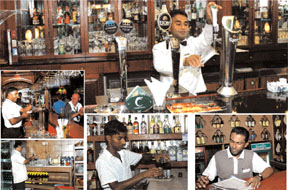|
observer |
|
|
|
|
|
OTHER LINKS |

|

|

|
Ups and downs in Colombo's bar-room milieuIt was this very newspaper in its then popular but now sadly extinct 'Roundabout' column which carried the story that two Englishmen had gone to the Colombo Public Library and demanded two bottles of beer.
The bemused library assistant at the reception had informed the Englishmen of the true nature of the place whereupon the Brits had become angry. Apparently what had happened was that the English duo had asked a passerby where they could find a pub and had been duly directed to the Public Library or pub in short! In Sri Lanka we do things differently and prefer to call our watering holes bars. The official nomenclature is liquor restaurant. There are of course bars and bars. It was this other connotation of the word which prompted former press baron Esmond Wickremesinghe to inquire apropos a senior Lake House editor, "How is so and so," still practising at the bar?" Bar, pub, liquor restaurant call it what you will, watering holes are among the favourite meeting places of the male of the species. From the lowly toddy tavern at Kotahena to the posh bars of five-star hotels, the common denominator is the consumption of alcoholic beverages. Consumed in certain limited quantities such beverages can induce a euphoric effect. Consumed to excess it can lead to inebriation. Bars have a milieu peculiar to them. The regulars know each other by name and are often on back-slapping terms. Drink induces camaraderie as nothing else can, although it can also lead to aggression and braggadocio. There are those who become boisterous after drinks, while others withdraw into a meditative cocoon. There are those who boast after a few and Manchausen-like tales are quite common in bars. There are those who hold forth on subjects with which their acquaintance is at best remote. The atmosphere of the bar is one of heightened machismo, a hail fellow, well met kind of camaraderie, boisterous bonhomie. Bars are the temples to Bacchus, the medieval god of drunken revelry, where the tribe of hard-drinking males gather to propitiate the godhead. The passage of time and economic pressures have led to the closure of several well-known bars in Colombo Fort and Pettah. Sometimes, owners find it more economic to sell the property than run the bars. Among bars which have been closed down are the National and the Lord Nelson. The Bristol and the Victoria were not re-built after they were burnt down during Black July. Another bar to be closed down in Fort was the Royal which quite unregally was little more than a hole in the wall where patrons sat on pakis petti with rats scurrying under their feet. As the previous paragraph would have indicated, the bar owners have a fondness for colonial names. There is still British India going on in the Fort (though considerably debilitated by its proximity to the President's House and its consequent security precautions) while the New Colonial reigns opposite the Fort railway station. It is in Colombo's bars that neo-Colonialism flourishes. There is also a species of bar which goes by the name of members' only clubs though the owners would be hard pressed to furnish a membership list. These also masquerade as sports clubs. The conspicuous sporting icon is often a billiard table and there was a club in Kotahena where until recently a sword was concealed under a zinc cover. Time has taken its toll on the once proud bars of Colombo. Time was, when apart from drinks they served palatable meals including surprisingly good western courses. Today, they are little better than drab, dispirited hostelries alleviating the monotony of middle-class male life. (Written at the Press Club, the scribes' pub, June 29) |







